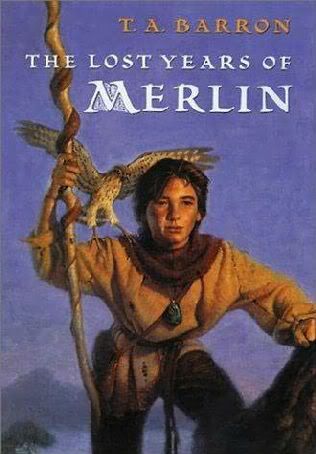
The Lost Years of Merlin
TA Barron
Orphaned by the raging sea upon the ancient shorts of Wales, a boy is forced to confront the riddle of his own mysterious existence. Who is he? What is his name? What is his destiny?
The boy makes his escape to the enchanted isle of Fincayra, convinced that there - in the mist-shrouded land between heaven and the shy – he will find the answers to his quest, but the mystery of his identity deepens.
His quest – and Fincayra’s fate – are inexplicable entwined, and his voyage of discovery has begun…
Revisiting this book has been an absolute joy for me. I can’t remember the last time I read it, or when I first picked it up, but it’s one of those books that you read when you’re very young and little snippets of it cling in your brain and it inspires your for the rest of your life. It’s so ingrained in my personal view of the world that it seems impossible that I ever existed before not reading it.
I may be overhyping it just a bit, but if you haven’t read this version of Merlin’s boyhood, I highly recommend it. This is the first in a series of five- all of which I will be reviewing here – and it’s one of the books that really cemented my love of Arthurian tales, in particular, and my fascination with myth in general.
And, oddly enough, it isn’t Merlin himself that does this for me. It is his mother, who spent her days surrounding herself with books and stories when she was young. For the majority of the book, Merlin has no memory of his life before eight years of age and does not believe that his mother is who she says she is because he can tell she is lying to him, but he still holds her in great affection for the stories she raises him on. She has no loyalty to one religion or cultural history, but blends them together in the very same sort of balancing act I started adopting in high school. Merlin learns to treasure the stories of the ancient Greeks and Celts and the budding Christianity in that part of the world equally and they all become part of him through her teaching. I identified with this young, eager Merlin (still calling himself Emrys then), naturally, but more than that I could imagine myself right there with him in that little hut in the cold spring of Wales listening to self-named Branwen tell us stories about everything in the earth and heavens and in-between places.
And this all takes place within the first few chapters of this first book, if you can believe it. The words in this book are powerful and I am astounded by how much my belief in the world followed the path of “Branwen’s” words in those early chapters.
Of course, I would also recommend this book on the quality of its young Merlin storytelling, as well. I adore that this book makes Merlin both eager to use his powers, but also deals harsh consequences for foolishness. These consequences, in fact, blind him in the early chapters of the book and this added element to young Merlin’s struggles fascinates me in ways that I don’t think I could ever properly explain.
I could probably write about this book all day. Sufficed to say, if you have any interest in Arthurian stories (the parallels between Merlin’s young life and his time with Wart makes me chuckle) or Merlin stories or even fantastical adventure stories, you should read this book.






1 comment:
I'm a huge fan of this series and your review was very accurate on the affects this book has on you.
Great review!
Post a Comment